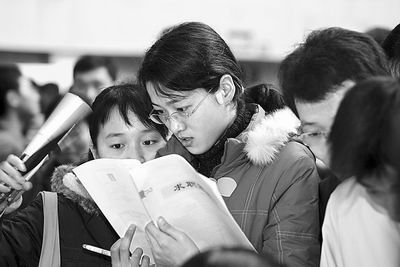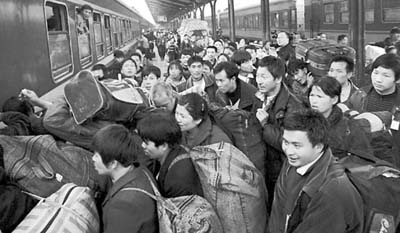|

|
|
Chinese college graduates at a job fair. |
Young Chinese people's approach to career selection has undergone a significant change since the reform and opening-up. There have been three identifiable stages of development.
Under the planned economy, employment was guaranteed by the State
From 1978 to the mid-1980s, under a planned economy, most young people in rural areas were engaged in farming due to measures to limit migration between villages and cities. Only a small number passed the college entrance exam for higher education.
Urban youth without a degree had access to their parents' positions. The employment of college graduates was guaranteed by the state.
According to a survey conducted in 1984, during this period urban youth considered social status to be the top priority when selecting jobs. Additionally, young employees preferred government departments and large-scale industry to business opportunities.
The attitude of young Chinese towards job selection begins to open up
As agricultural reform was initiated in the 1980s, large numbers of rural employees were freed from agricultural production under the household contract responsibility system. At the same time, non-agricultural enterprises were in urgent need of staff, and the state also reduced restrictions on internal labor force migration. All of these factors contributed to the flow of rural workers into urban areas. Rural youth were more open-minded when job-seeking.
From 1985 the country gradually removed the state-backed graduate employment system, encouraging young people to find jobs through the market. Young job hunters began to attach greater importance to income and welfare benefits.
The liquidity of youth employment also grew from the mid-1980s.
Employment diversification has prevailed from the mid-1990s
|

|
|
A large number of Chinese migrant workers flow in the country. |
Since the mid-1990s, rural youth have been able to migrate freely into urban areas. Large numbers of rural workers have come to work in the cities and even settle there.
As Chinese colleges expanded enrollment, and government departments and state-owned enterprises reorganized, the employment situation became much tougher.
Educated young people now focus on development prospects, income and welfare benefits, as well as the working environment. The service sector has become one of their preferred choices. Additionally, college graduates prefer to work in a field that interests them, and can balance their choice between what they would like and what is available. Chinese young people are less dependent on their parents, and some of them now set up their own businesses.
In summary, there are three characteristic features of the employment market for Chinese youth, these being independence, pragmatism and diversification.
(China.org.cn by Yang Xi, October 8, 2008)